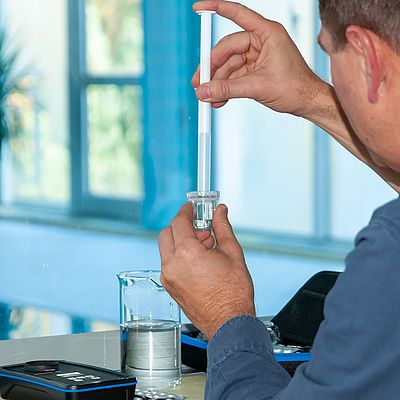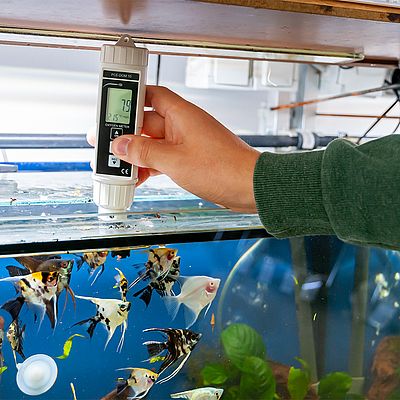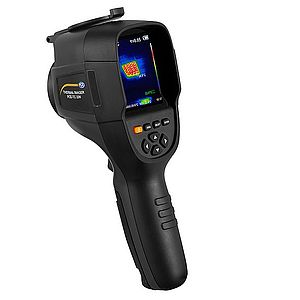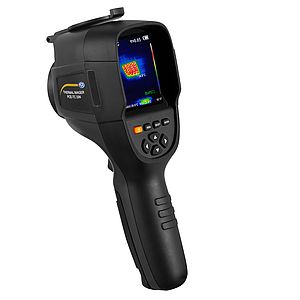PCE Instruments. There are various ways to determine the pH value. One method that is very easy to handle and has been used for a long time is the use of indicator dyes. From litmus paper and other test strips, however, the pH value can usually only be determined roughly as an integer value or across a limited measurement range. In contrast, even simple electronic pH meters show the pH value with two decimal places across the entire range from 0.00 to 14.00.
Reasons for pH measurement
The pH value indicates how acidic or alkaline an aqueous solution is. Everyone knows the term acidic and the effect of vinegar and lemon juice. On the opposite side of the pH scale, above the neutral value of 7.0, there are alkaline bases which include normal soap, bleach, concrete and caustic soda. While we are surrounded by many acidic or alkaline substances every day without feeling it directly, the pH value has a serious influence on the course of many processes. Here are a few examples:
The pH value in humans
For many biochemical processes in the body, complicated processes adjust the pH value to the required range. If the pH value in the blood deviates from the normal values, this is an indication of certain disorders or diseases. The protective acid mantle of the skin with a pH value of 5.5 usually regenerates itself. However, for sensitive skin and frequent use, it is recommended to use washing substances and cosmetics with a skin-neutral pH value.
The right pH value for plants
The pH value of the soil influences the roots' ability to absorb nutrients and trace elements. Most crops require a pH value between 5.7 and 6.5 in medium-heavy soils. The current pH value can be determined with a soil pH meter and adapted to the needs of the respective plants by targeted soil improvement.
The pH value in swimming pools
The pH value can be determined with a pH meter and, if necessary, adjusted by adding certain substances. The value should be adjusted to 6.5 to 7.6 according to DIN 19643. Values between 7.0 and 7.4 are recommended while drinking water may have values between 6.0 and 8.5 and seawater has a pH value between 7.5 and 8.4. The pH value of the pool water is one of the decisive factors for the effectiveness of the disinfectants and maintenance products.
Selection criteria for pH meters
Measurement range, resolution and accuracy. Almost all electronic pH meters cover a measurement range from 0 to 14 and display the value with two decimal places. The measuring accuracy of good devices can be up to 0.01.
Temperature range
Since the pH value is temperature-dependent, it is recommended for most applications to choose a test instrument with automatic temperature compensation (ATC). The user must make sure that the temperature of the samples to be measured is within the range of the temperature compensation.
Calibration and adjustment facility
Simple pH meters only allow linear adjustment of the values to a single calibration value by means of an adjusting screw. More sophisticated pH meters feature a two- or even three-point adjustment via internal algorithms. These are more suitable when precise values are required.
Electrode selection
Nearly all pH meters work with external probes. These can be easily replaced when they are worn out. For some applications, there are special pH electrodes, for example for penetrating soils or meat. If the pH meter has a BNC socket, any other pH electrode with a BNC connector can be used instead of the original probe.
Additional functions of a pH meter
Some pH meters offer additional functions such as storage of the measured data, interfaces for transferring the saved data or the possibility to measure other values as well. Parameters that can be recorded with an appropriately equipped pH meter include, for example, temperature, conductivity, salinity, the TDS content and redox value.
Broad spectrum for different requirements
As a supplier of measuring, testing and laboratory equipment, PCE Instruments offers a wide range of pH meters. Founded by German engineers, the company offers measuring instruments for many different areas of application. Thanks to many years of cooperation, the portfolio includes products from first-class manufacturers as well as PCE’s own test instruments the development and manufacture of which benefit from the experience of two decades.
In the field of pH measurement, the product range extends from devices for individual measurements in swimming pools to devices for continuous measurement in aquariums and professional devices with a memory function and data interface for use in industry, trade and research.
For the available pH meters, PCE Instruments also offers the necessary calibration and storage solutions and special pH electrodes for various applications.
Ludger Droste - PCE Deutschland GmbH






















